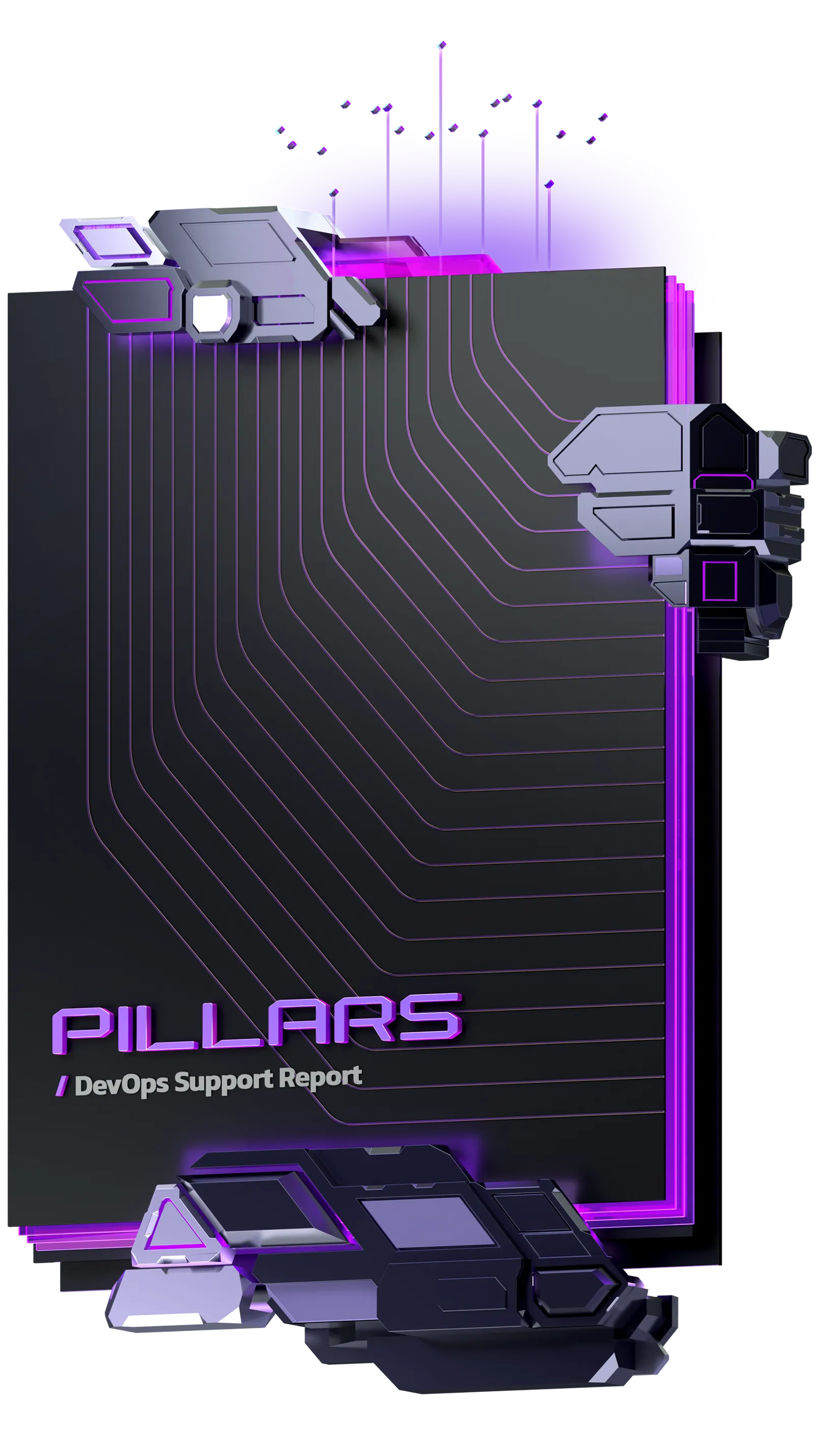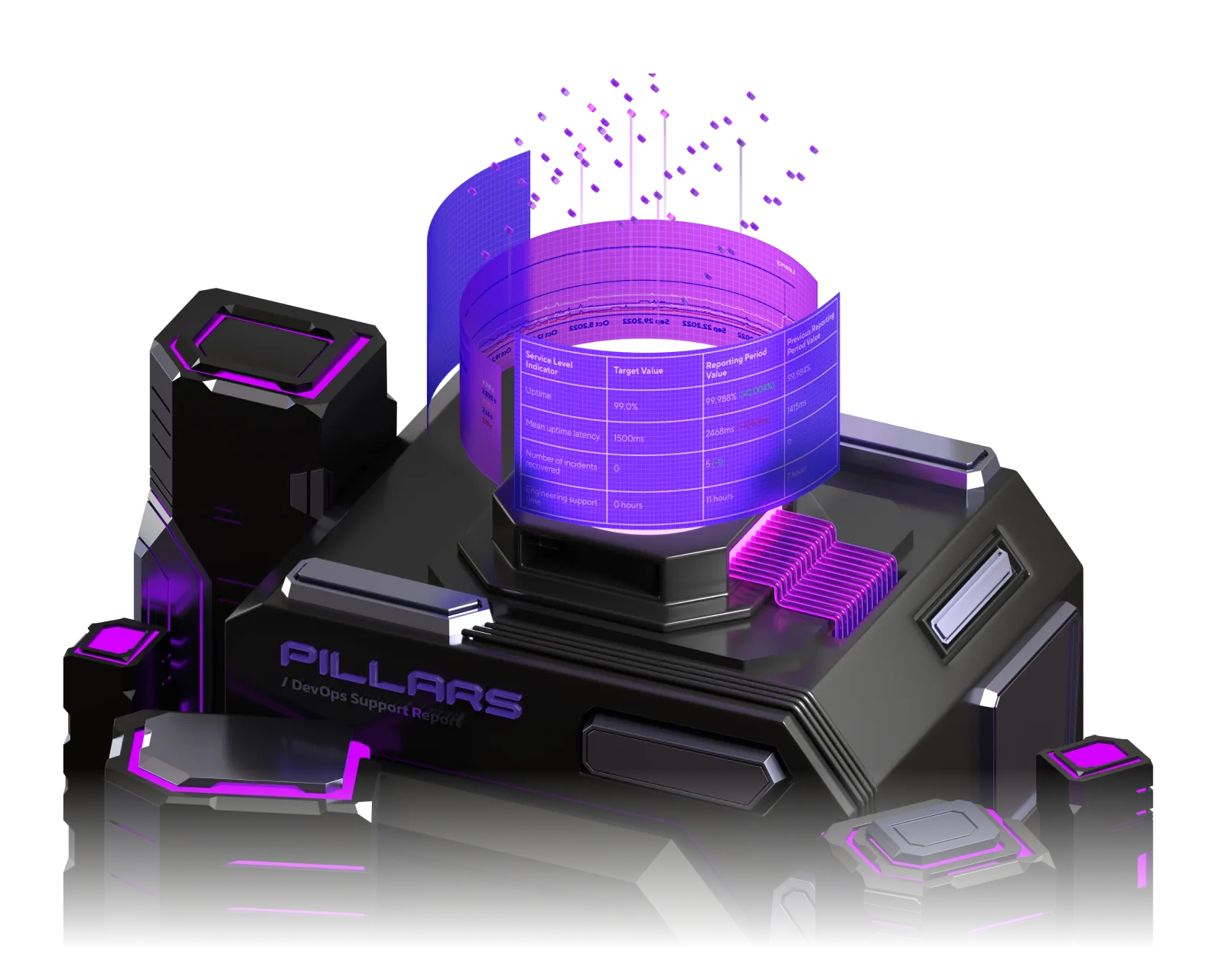PREVENTING DOWNTIME 24/7
Pillars ensures continuous system reliability with expert SRE and DevOps solutions. Our experienced engineers work to improve the stability of websites, minimize downtime, ensure fault tolerance, and enhance security.
20+
advanced tools and technologies used in SRE
17+
years of experience in the IT systems
99,9%
uptime for your services guaranteed by SLA







Experts in Site Reliability Engineering (SRE), ensuring seamless website performance.
Our team of skilled DevOps engineers, powered by Shakuro — a well-established design and development agency with deep technical expertise and a strong design background — has faced similar challenges in the past, inspiring us to create this service to support your business.


Our mission
To be the foundation that ensures your website’s stability and availability
Our principle
We don’t just fix issues; we proactively prevent them to ensure resilient operations.
Our guarantee
With Pillars, you access top-tier specialists without overspending, ensuring 24/7 system uptime

Why SRE matters?
SRE specialists act as a trusted partner, working behind the scenes to keep things on your website running smoothly.
They proactively address issues such as site outages, downtime, and slow performance before they impact your users. This will help to prevent costly disruptions and save your customer's loyalty.


Is your website in need of SRE?



Still not sure?
Take the test to accurately and quickly determine whether you need SRE services, based on the specifics of your infrastructure and stability requirements.
What you get as a client of pillars
24/7 monitoring of key metrics and logs to ensure your infrastructure's reliability and performance.
Save money by keeping your business running continuously
A skilled team of seasoned professionals.
You can send a special command to a dedicated Slack channel to report if an issue arises, and we will respond within 15 minutes.
We integrate directly with your infrastructure, making setup and collaboration seamless
Customized Service
Level Agreements (SLAs)

analyzing your system, performing initial setup
We will assess the current state of your infrastructure and deliver detailed recommendations in a report before the initial system setup.

24/7 support
& control maintenance
We monitor your systems 24/7, but if you'd prefer to stay informed, you can check the status in real time. If you notice any problems, let us know by pressing the 'Alert' button, and we'll fix it within 15 minutes.

Monthly reports
We provide monthly reports with detailed insights into system performance, uptime statistics, incident response times, SLA compliance, and recommendations for improvement.

Pricing & Inclusions
Starting from
Best for the clients who have 10 or less servers/nodes
+ Initial one-time setup price $1000
Includes preparing your infrastructure for monitoring, installing applications, and integrating them with your system.
What’s Included in $1,500?
All vital components of the website, including databases and key-value stores
24/7 metric monitoring and support
External availability monitoring
Internal infrastructure monitoring (additional metrics can be agreed upon with the client)
Response time: 15 minutes
Uptime and availability monitoring, including performance metrics
20 engineer hours per month included
Additional hours: $50 per hour
Available if the development team follows well-defined deployment processes (for example, using a deployer)
Implemented in coordination with the development team
ACCURATE PRICING PROCESS
We perform an audit of your system to determine the final price. If additional complexity is identified, the final price will be adjusted accordingly.

Additional devops, design, and development solutions
In addition to SRE services, we provide a comprehensive range of design and development solutions to meet your needs.


Tools & Technologies we are experts in


cloud providers
We know which service is best suited for solving specific tasks. Whether you need scalable computing, managed databases, or cost-effective storage solutions, we help you choose and configure the right cloud resources.
- Amazon web services
- Google cloud
- microsoft Azure
Containerization and orchestration
We specialize in maintaining highly available Kubernetes clusters, ensuring seamless scaling and resilient containerized environments—from deployment to optimization.
- docker
- Kubernetes
Monitoring
We set up monitoring and observability to provide key insights, real-time alerts, and root-cause analysis, ensuring optimal performance and fast issue resolution.
- Prometheus
- StackDriver
- New Relic
Load Testing
We conduct load testing to estimate infrastructure needs, identify bottlenecks, and optimize performance before issues arise.
- ApachE Jmeter
- Gatling
- Yandex.tank
infrastructure as a code
We implement Infrastructure as Code (IaC) for consistency, automation, and scalability. Using tools like Terraform and Ansible, we ensure version-controlled, repeatable, and secure infrastructure management.
- Terraform
- Ansible
Development, CI/CD and Devops
We optimize code and CI/CD pipelines for efficiency and reliability, ensuring faster delivery and reduced deployment risks. Our team can also audit or enhance your product for an additional fee.
- Jenkins
- Azure devops services
- GitLab
Logging and analysis
Logging is key to understanding your application. We set up structured logging with centralized storage, automated parsing, and analytics for full system visibility.
- Grafana loki
- ELK
on-call sre & communication
We provide 24/7 SRE (Site Reliability Engineering) support for applications that require high availability and fast incident response. Our team proactively mitigates incidents, ensures uptime, and keeps your systems running smoothly around the clock.
- Slack
- Pagerduty
Case Studies
This section presents real-world cases we have encountered while working with customers and how our SRE team has resolved critical issues
K8s cluster instability incident
An uptime alert was triggered, indicating a disruption in service availability. After a thorough analysis, our engineering team identified the root cause: technical issues within the Kubernetes (K8s) cluster, leading to instability and affecting overall system functionality. This case required immediate attention to restore service and ensure the reliability of the client’s infrastructure.
Impact
Issues with the K8s cluster caused a brief service disruption, with less than an hour of downtime in some global regions, impacting local users. The team quickly resolved it to minimize effects.
Resolution time: 10 min
Investigation
After the alert, our team promptly investigated, analyzing the K8s cluster config, node health, and logs to pinpoint instability. We found malfunctioning nodes causing service disruptions across regions.
Resolution time: 15 min
Action
Cluster Reconfiguration: The K8s cluster config was reviewed and restructured, with settings tweaked to optimize resources, improve load balancing, and boost stability, resolving the service disruption causes.
Resolution time: 15 min
Resource Increase: To manage higher load and boost performance, we added more nodes and increased their capacity in the K8s cluster, ensuring stable operations.
Resolution time: 10 min
Technical Maintenance: We conducted full maintenance on the Kubernetes cluster, checking node health, resource usage, and updating components to optimize performance and reliability, preventing future issues.
Resolution time: 10 min
Post-reconfiguration, cluster was tested and stabilized. Services restored in <1 hour, bringing affected regions back online.
That’s why we have a dedicated Slack channel, available anytime.
One of the key advantages of our service is instant support via a dedicated Slack channel. Clients can trigger an alert using a specific command, and our team responds within 15 minutes. In this case, a client reported an issue with payment processing after noticing that transactions were not being completed successfully. The alert prompted immediate action, and our team quickly resolved the problem to restore normal operations without further disruption.
Impact
The misconfiguration in the DNS record caused the payment gateway to become unreachable, resulting in failed payment transactions. This impacted the client’s ability to process customer payments in real-time.
Resolution time: 5 min
Investigation
The engineering team responded within 15 minutes of the manual Slack alert. Initial diagnostics included reviewing deployment logs, DNS settings, and payment system response data. The issue was identified as a failed DNS verification caused by an incorrect redirect configuration.
Resolution time: 10 min
Action
Rollback Deployment: To address the urgent issue, our team quickly rolled back the recent deployment, restoring the system to its stable state without requiring developer intervention, minimizing service disruption.
Resolution time: 10 min
DNS Issue Resolution: Our team quickly identified the error in the DNS setup through detailed and informative logs. The misdirected DNS record was updated, ensuring that the correct payment gateway URL was resolved, and the redirect issue was eliminated.
Resolution time: 5 min
The DNS issue was resolved, and payment transactions resumed successfully. The client was notified, and no further issues were reported.
Unexpected Traffic Surge
In anticipation of increased traffic during Black Friday sales, our team took proactive measures to prevent service disruptions. Understanding that the site sells products and would likely experience a significant increase in visitors, we recommended that the client increase the number of replicas for automatic scaling.
Impact
Despite proactive measures to handle increased traffic during Black Friday sales, the monitoring system detected a drop in service availability. This was due to an unexpectedly high volume of incoming traffic, resulting in delays and temporary performance degradation for some users.
Resolution time: 2 min
Investigation
Upon receiving the alert, the support team quickly analyzed the load metrics. They determined that the primary cause of the issue was insufficient backend resources to handle the surge in requests, leading to increased response times.
Resolution time: 5 min
Action
Thanks to prior planning and automatic horizontal scaling setup, the system automatically increased the number of backend instances, distributing the load across additional servers. This restored the application’s performance without requiring manual intervention from engineers.
Resolution time: 3 min
Recommendation
Reviewing the auto-scaling trigger thresholds is recommended to ensure an even faster response to similar load spikes in the future.
Load testing should be conducted to assess the system's resilience to sudden traffic surges.
ISSUE IDENTIFIED AND FIXED WITHIN 10 MINUTES. PERFORMANCE FULLY RESTORED.
Mitigating a small DDoS attack and restoring service availability
The monitoring system triggered an uptime alert, indicating a disruption in service availability. Our team quickly identified the root cause: a small-scale Distributed Denial-of-Service (DDoS) attack was targeting the website, overwhelming it with a high volume of malicious requests.
DDoS attacks flood a system with excessive traffic, exhausting resources and making it inaccessible to legitimate users, while also exploiting network vulnerabilities to impact servers, databases, and other critical components.
Impact
The monitoring system detected a service disruption. Upon investigation, the team identified a small-scale DDoS attack overwhelming the site with malicious requests, causing a complete outage and degraded performance.
Resolution time: 5 min
Investigation
The team conducted a deep analysis of incoming traffic patterns. They discovered that a significant portion of the traffic came from suspicious sources, likely generated by botnets. This traffic flooded the system and caused resource exhaustion, making it difficult to distinguish legitimate requests from malicious ones.
Resolution time: 10 min
Action
To mitigate the DDoS attack, traffic filtering rules, rate limiting, and anomaly detection were applied to block malicious requests before they reached the infrastructure. It was noted that the client's WAF had been disabled to reduce costs. However, the Web Application Firewall (WAF) was re-enabled to provide additional protection against the attack.
Resolution time: 8 min
Scaling infrastructure: Backend servers were scaled up, bandwidth was increased, and load balancer configurations were optimized to handle the surge in traffic and prevent further strain on resources.
Resolution time: 7 min
Recommendation
Enhance DDoS protection: Strengthen automated DDoS mitigation mechanisms, and implement more advanced rate-limiting rules to prevent similar incidents in the future.
Conduct security audits: Perform regular security assessments to identify vulnerabilities and improve infrastructure resilience.
ISSUE IDENTIFIED AND FIXED WITHIN 30 MINUTES. SERVICE FULLY RESTORED.

What if I already have a DevOps team?
Can your team reliably support critical infrastructure 24/7?
If your DevOps team is truly capable of providing 24/7 support, even during peak load periods, you may not require our services.
What to do if the DevOps team is struggling with the load?
Our SRE team can seamlessly integrate with yours, providing continuous monitoring and maintenance to keep your systems running smoothly.
How to improve system stability without unnecessary costs?
You don’t need to hire additional specialists or invest in extra resources—we ensure the continuous stability and reliability of your website by managing your infrastructure
Can your DevOps team collaborate with Pillars?
Yes! We will smoothly align with your processes and work to strengthen your DevOps team.
HAve any questions?
All key information is provided here. If you need further assistance, feel free to contact us at hello@shakuro.com
